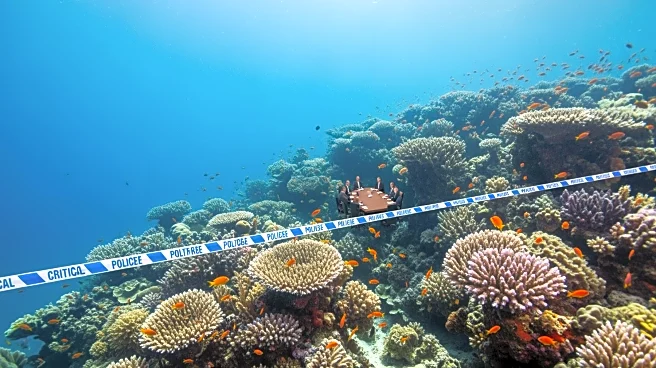What's Happening?
Ayana Elizabeth Johnson, a prominent climate scientist, delivered a compelling speech at the TIME Earth Awards, urging immediate action against climate change. She emphasized the urgency of replacing passive hope with decisive, science-driven solutions.
Johnson highlighted the dire consequences of climate change, citing recent extreme weather events like Hurricane Melissa, which devastated Jamaica. She attributed the climate crisis primarily to fossil fuel and big agriculture executives, as well as their PR firms and supportive politicians. Johnson stressed that solutions such as transitioning to clean energy, protecting ecosystems, and sustainable food production are already available and need to be implemented swiftly. She called for cultural change to precede policy change, drawing parallels with historical movements like civil rights and gay marriage.
Why It's Important?
Johnson's speech underscores the critical need for immediate climate action to prevent further environmental degradation. Her call to action is significant as it highlights the interconnectedness of climate change with various societal issues, including national security, public health, and economic stability. By advocating for cultural change, Johnson emphasizes the role of influential individuals and organizations in shaping public perception and accelerating policy shifts. Her message is a rallying cry for collective responsibility, urging individuals to leverage their platforms, networks, and financial resources to drive change. The speech serves as a reminder that addressing climate change is not only a scientific challenge but also a cultural and political one.
What's Next?
Johnson encourages individuals to actively participate in climate action by using their platforms and votes, divesting from fossil fuels, and adopting plant-based diets. She calls for increased public discourse on climate issues, noting that two-thirds of Americans rarely hear about climate change in the media. Johnson's speech is likely to inspire further discussions and initiatives aimed at accelerating climate solutions. Stakeholders, including policymakers, businesses, and civil society groups, may respond by prioritizing sustainable practices and policies. The speech could also influence cultural productions, such as films and music, to incorporate climate themes, thereby raising awareness and inspiring action.
Beyond the Headlines
Johnson's emphasis on cultural change highlights the ethical dimension of climate action, suggesting that societal values and norms must evolve to prioritize environmental sustainability. Her speech challenges the audience to reconsider their personal and collective responsibilities in the face of climate change. By advocating for divestment from fossil fuels, Johnson addresses the financial industry's role in perpetuating the crisis, urging a shift towards ethical investment practices. The speech also touches on the potential for large-scale human migration due to climate impacts, raising questions about global equity and justice.
















